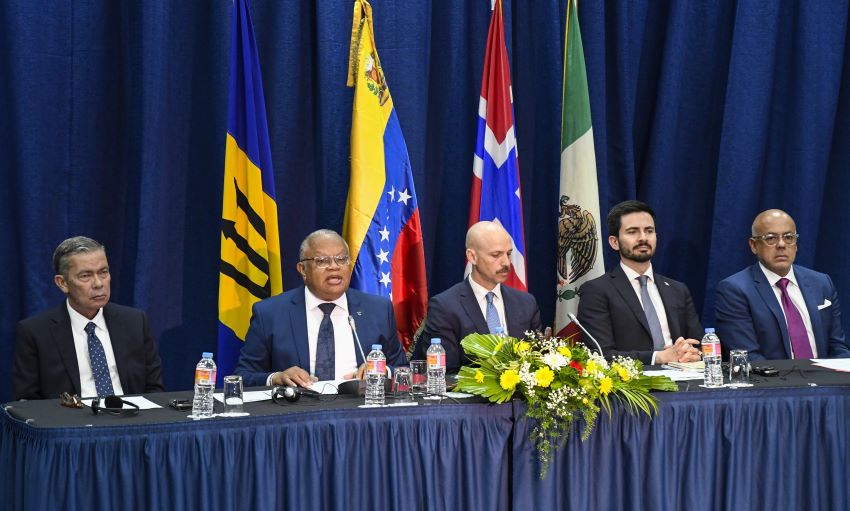
The Lloyd Erskine Sandiford Centre (LESC) in Barbados was the venue for the historic signing of an agreement between Venezuela’s two main political parties aimed at ending the political crisis between both sides.
The agreement was brokered by Norway and signed in the presence of some international journalists. The deal is also expected to see the relaxing of United States sanctions imposed on the South American country’s energy sector during the Nicolás Maduro administration.
The ceremony marked the end of a process, initiated by Prime Minister Mia Amor Mottley, back in 2019 when, in an effort to de-escalate tensions in the South American country, she invited the two parties to Barbados to engage in talks.
The LESC was chosen as a neutral location for the parties to work towards a peaceful resolution.
President of the National Assembly of Venezuela, Jorge Rodriguez; opposition delegate, Gerardo Blyde; and President Nicolás Maduro’s son, Nicholas Maduro Guerra, signed the agreement.
Delivering remarks on the historic occasion, Barbados’ Acting Minister of Foreign Affairs and Foreign Trade, The Most Honourable Senator Dr. Jerome Walcott, stressed that the signing would see the deepening of ties between Venezuela and the region, including the possibility of a second PetroCaribe agreement for cheaper oil prices.
He said: “The conclusion of these negotiations and what they portend has major significance, not only for the people of Venezuela but also for all Caribbean States, where there is recognition of the Caribbean Sea as a Zone of Peace. This is a message that Barbados and its regional neighbours have been repeating in all regional and international fora, and that it is never too late for dialogue. Venezuela has always been helpful to the Caribbean whenever energy crises have loomed, from the San Jose Accord in the 1980s to the PetroCaribe initiative in 2005.”
Renewing Barbados’ commitment to maintaining dialogue with Venezuela, he stated: “Now that the process has been concluded and Venezuela moves towards regaining its economic independence, we are looking forward, in the very near future, to a PetroCaribe II arrangement. Just as dialogue has brought a positive outcome in this process, we, as members of the Caribbean Community, look forward to continued dialogue with Venezuela on matters of regional interest.”
Dr. Walcott, noting that the next few months would be “very important” to the South American country, added: “Barbados pledges its support as you implement the provisions of the agreement. We stand ready to play our part.”
While Mr. Rodriguez remarked that in the coming days, Venezuelans and the international community would begin to see the manifestation of the agreement, Mr. Blyde thanked Barbados for its role in the negotiations and described the process as a victory for democracy. “All Venezuelans must contribute to the materialisation of this agreement, ensuring that the will of all of us is guaranteed,’ the latter stated.
